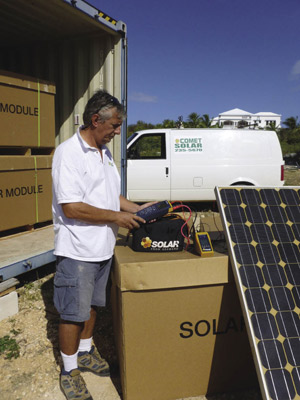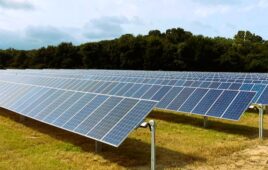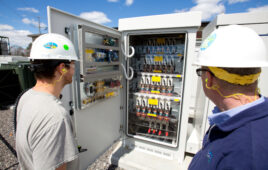 Comet Solar is an established solar installation company based in the British Overseas Territory of Anguilla. With some of the best beaches in the world, the local economy is largely focused on tourism. Comet has been successful in encouraging local hotels, resorts, property owners and businesses to invest in solar installations to offset the effects of the economic downturn and rising energy costs.
Comet Solar is an established solar installation company based in the British Overseas Territory of Anguilla. With some of the best beaches in the world, the local economy is largely focused on tourism. Comet has been successful in encouraging local hotels, resorts, property owners and businesses to invest in solar installations to offset the effects of the economic downturn and rising energy costs.
“Cost is critical to our customers, so we tend to look for PV modules at bargain prices,” says Chris Mason, owner of Comet Solar. “Without any subsidies or incentives and facing aggressive resistance from the utilities, solar has been a difficult sell. It is only because the cost of electricity is $0.43/kWh that we have any customers at all. At that rate, and if we had net-metering, our payback on solar PV systems would be about three years.”
Comet customers tend to focus on price and return on investment, with aesthetics often low on the list of purchasing factors. However, buying bargain-priced solar PV modules brings its own challenges. Second-hand or refurbished modules are often used, but in some cases the history of the modules and the original manufacturer is not known.
A lack of formal installation standards or regulations presents issues for installers. For example, operating in a Caribbean jurisdiction means that Comet is not specifically required to perform the same tests that as a British or U.S.-based installation company .
Despite this, Comet always applies and meets the existing standards of the
U.S. NEC code and performs best practices of the industry in the interests of maintaining installation quality.
To achieve this goal, the company recently invested in a Seaward Solar PV150 solar-installation test kit, along with a 200R irradiance meter to carry out effective quality control and customer-reassurance testing on its products and installations.
The Seaward Solar PV150 is a dedicated multifunction PV electrical tester designed specifically for solar installation. It performs open-circuit voltage measurements (Voc), short-circuit current measurements (Isc), earth continuity, insulation resistance and operating current, using AC/DC current clamps.
With the push of a single button, the new combination tester carries out the required sequence of electrical tests in a safe and controlled manner, avoiding the risk of contact with exposed live DC conductors. Results can be recorded and stored in the tester for subsequent USB downloading to a PC.
“To ensure the quality of the products we sell to our customers, we feel it is important to carry out testing thoroughly and effectively,” Mason says. “We owned standard test instruments and DC clamp meters but found that these manual methods were prone to error and were not particularly practical in the field. There is also no efficient way to record the results. We therefore decided to find a portable but capable testing system that would document the performance of each module in a recordable way.”
Recently Comet was offered a container of 170-W used monocrystalline solar panels and installed them in a 12-kW commercial flat-roof system.
These PV units had been replaced on their original system due to yellowing of the backing, but they were otherwise in perfect electrical and mechanical condition. As the modules were used, Comet tested every unit prior to installation to ensure the quality and safety of the modules and to prevent subsequent dismantling for any troubleshooting required.
Comet constructed an improvised test bench at the installation site and tested every module as it came out of its packing. All testing was carried out during the middle of the day to make use of full sun. Every one of the 66 modules were tested individually and no issues were found, with all units performing as expected with little variation between the modules, without ground faults or open circuits.
Most importantly, the speed of the test system allowed Comet to perform full tests on each module without impeding the work of the installation crew.
The test data for each module was downloaded and given to the owner as a system spreadsheet to prove that testing had been carried out thoroughly to verify the module quality and confirm anticipated system performance.
Comet’s latest solar PV installation project is much larger and so requires different testing. The company is currently installing 500kW of Canadian Solar 240-W modules, purchased directly from the manufacturer. Comet won’t pretest every module because of the modules’ known quality, but it will test each string at the combiner before installing fuses.
Working to NEC requirements does not allow for easy testing of the installation as it would be with a typical British system. The wiring is always in conduit and the combiner circuits are hard-wired, so there is no easy way to test installed strings on larger systems. For these larger projects, Comet will be using 1000V-rated test leads with alligator clips.
“Using the PV150 system on an installation in front of the client gives a sense of security that the installers are professional and are doing the project properly,” Mason says. We are seeing the emergence of some less-than-professional installers in the region who perform poorly crafted installations, test nothing and do not give the customer any comfort that the work is being done properly.”
“Documenting system performance at commissioning gives us a baseline against which to retest in the case of a complaint or problem, both with customers and manufacturers,” Mason says. “For this use alone, the test kit and reporting system is invaluable.”




Tell Us What You Think!